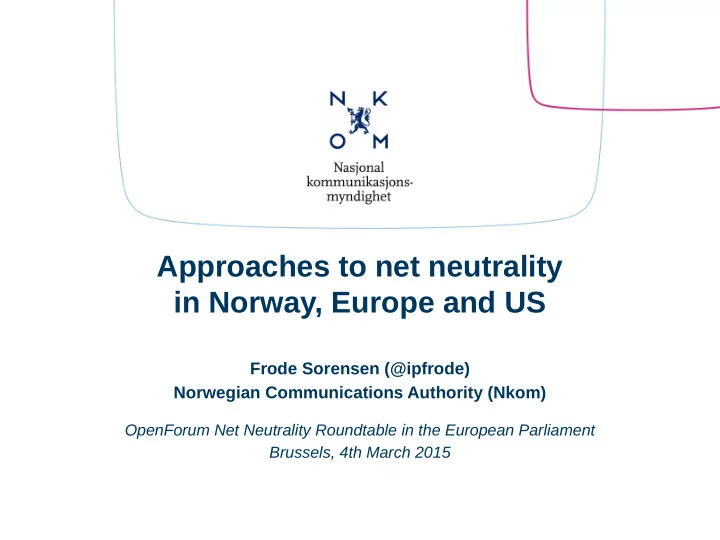

Approaches to net neutrality in Norway, Europe and US Frode Sorensen (@ipfrode) Norwegian Communications Authority (Nkom) OpenForum Net Neutrality Roundtable in the European Parliament Brussels, 4th March 2015
The Norwegian approach to net neutrality • Nkom use a co-regulatory approach to net neutrality. • The Norwegian guidelines for NN launched in 2009. • The longest running net neutrality regime in Europe. • Guidelines followed by stakeholders of the industry. • The Guidelines are comparable with the Parliament resolution April 2014: Transparency (of course) Allow specialised services Non-blocking and non-throttling Allow reasonable traffic management 2
Rough NN comparison Europe vs. US Europe / EP US / FCC No blocking X X No throttling X X No prioritisation X «Specialised X X * services» ** Ban zero-rating Case-by-case IP interconnect Case-by-case * The devil is in the details… ** Some national initiatives 3
«Specialised services» • Specialised services provide extensive exceptions from net neutrality – therefore they must be (virtually or physically) separated from the Internet access service at the network layer. must not be provided at the expense of the Internet access service (IAS). • Specialised services use built-in QoS mechanisms , and they do not need protection against IAS! It is the other way round; IAS needs protection against specialised services! 4
Application-agnosticism • Differentiation in line with NN should be done based on access speed or data volume as long as all applications are treated equally. • Differentiation based on specific content or applications would constitute a breach of NN. • Zero-rating favours specific content/applications where providers, instead of end-users, decide how we should use the Internet. • Application-agnostic QoS is however possible. 5
Do we understand the value of the Internet? • The Internet is different from traditional telecommunication. • Reverse engineering telecoms over IP can hardly be called innovation. • Internet applications are decoupled from the underlying network. • The Internet provides global connectivity. • We should avoid fragmenting the Internet. • Need for a pan-European approach to NN. 6
Recommend
More recommend